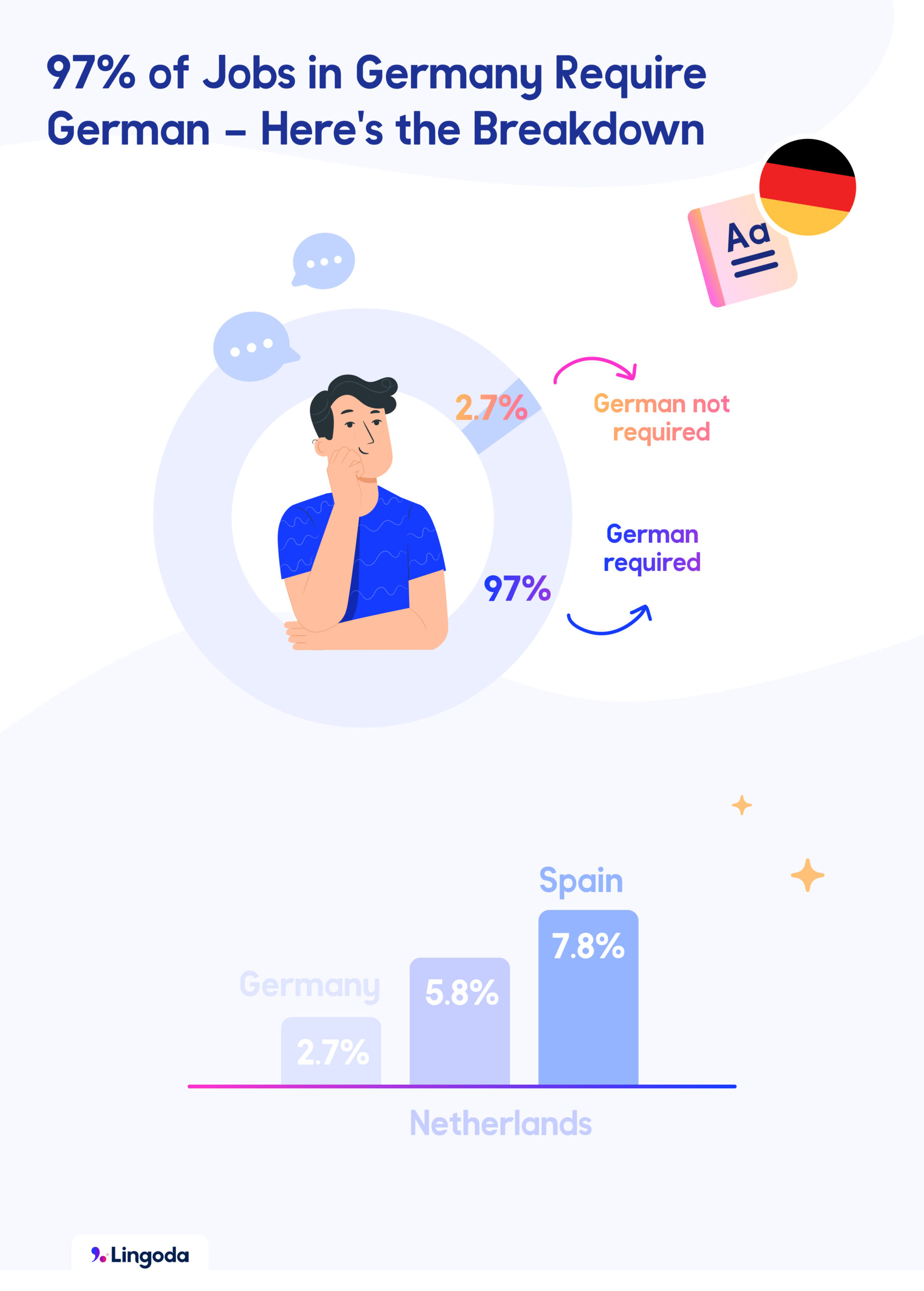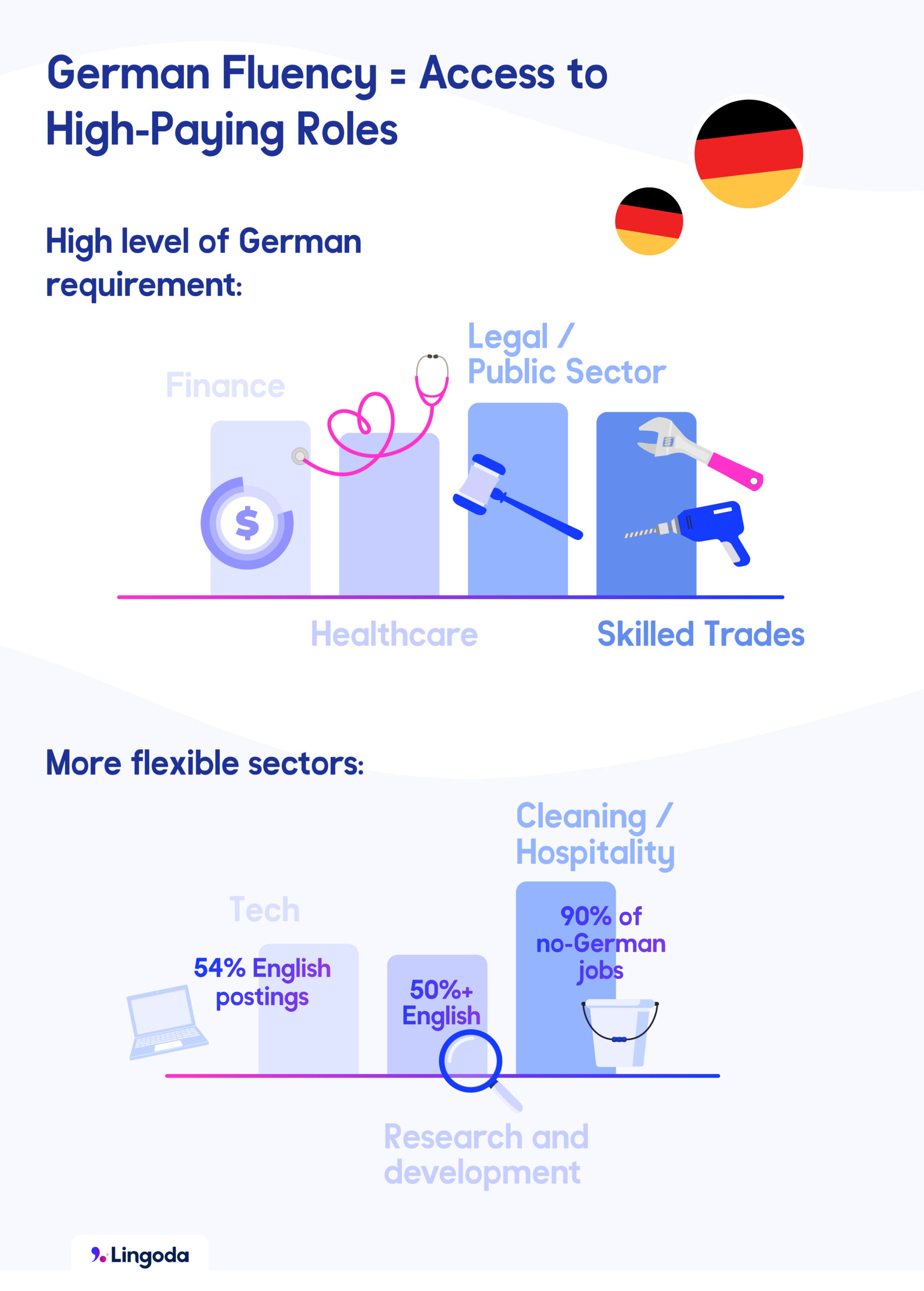Mastering German: The #1 Factor for Expats’ Career & Salary Growth in Germany (2025 Data)

Germany is one of the most attractive destinations in the EU for skilled workers, thanks to its robust economy, high quality of life, and wealth of career opportunities. But if you want full access to the country’s job market, speaking German is essential. With just 2.7% of job listings explicitly stating that German is not required, language proficiency is the key factor that determines an expat’s prospects. Fluency not only expands your job options; it also opens the door to higher-paying roles across various industries.
This article explores the state of the German job market in 2025, drawing on the latest data to examine language-related trends, industry insights, salary impact, and employer expectations, providing a clear and comprehensive guide for expats navigating the German job market.
- German language demand in job postings – 97% of jobs require German
- Salary impact – German proficiency increases earnings by 20%
- Employer expectations – why 59% of companies prioritize German skills
- Key takeaways and actionable advice for expats
German language demand in job postings – 97% of jobs require German
While internationalization is beginning to reshape the German job market, the reality remains: most jobs in Germany require some German proficiency. Certain industries and regions do offer opportunities to English-speaking migrants, but the number of these roles is fairly limited. German remains the default language for the vast majority of jobs, despite not being overtly stated in job postings y. In fact, it’s typically assumed, especially for client-facing or managerial positions.

Categories of job postings based on language requirements:
A detailed analysis of job listings in Germany reveals three distinct categories when it comes to language expectations:
- Roles that explicitly state "German required", leaving no ambiguity about the need for proficiency.
- 2.7% of listings, according to a 2024 Hiring Lab survey, clearly indicate "German is not required". This underscores how rare it is to find opportunities where English alone is enough.
- Job postings that do not mention language at all. However, in the German job market, silence on language typically implies that German is expected by default unless stated otherwise. Language is implicit in employability, even when it's not spelled out.
Insights from job posting analyses:
With only 2.7% of jobs explicitly open to non-German speakers, Germany stands out in Europe for its language expectations. In the Netherlands, 7.8% of jobs are open to non-Dutch speakers, while in Spain, 5.8% of openings don’t require Spanish. France and Italy also come above Germany, with more jobs available for people who don’t speak the local language.
Language requirements also correlate with salary potential. High-paying roles - as accounting or pharmaceuticals - have the lowest levels of language flexibility, according to the Hiring Lab survey. In contrast, traditionally low-wage sectors, like cleaning services and hospitality, welcome non-German-speaking applicants more openly.
However, there are reasons for optimism for non-German speakers. The Opportunity Card (Chancenkarte), launched in 2024, allows qualified migrants to work with either A1 German or B2 English skills. Five years earlier, the Federal Employment Agency recognized the need to recruit migrant workers in its annual report. A key pillar of this was improved language support for non-German speakers.
Regional insights – where can expats work without German?
Non-German-speaking expats may have better luck finding roles in major cities, where jobs often require proficiency in English. Hamburg leads the way, with 38% of roles requiring English, followed by Berlin with 30%, according to an article by Presse Portal. In the state of Hesse, home to Frankfurt am Main, 30% of jobs also require English. This may be due to the higher number of international companies and start-ups in these areas. However, simply because these roles require English does not mean that German isn’t required.
More rural regions such as Brandenburg, Saxony-Anhalt, and Mecklenburg-Western Pomerania offer far fewer opportunities, with only 11–12% of roles requiring English.
Implications for job seekers:
First, job seekers should assume that German proficiency is required unless a job posting states otherwise. Secondly, non-German speakers seeking work will need to target jobs in certain areas of Germany and in specific industries. Multinational corporations, tech start-ups, and research institutions are known to be open to English-speaking professionals, and English is sometimes the primary working language. People who don’t speak German may need to focus on low-skilled, service-sector jobs that often explicitly state that German is not required.

Industries with the most and least language flexibility
In certain sectors, German is non-negotiable:
- Finance, law, and public administration all require a knowledge of German laws and regulations, making fluency in German essential.
- In healthcare, doctors, nurses, and pharmacists must pass German language exams to gain certification.
- Skilled trades and manufacturing roles require at least intermediate German, often due to safety regulations.
- By contrast, expats may have more luck finding an English-only job in tech or R&D: 54% of IT postings require English, and some companies use English as the primary language in day-to-day operations.
- Over 50% of roles in research and development also specified that English skills were necessary, making this another possible field for expats.
The most accessible sector for non-German speakers remains low-wage industries like cleaning and hospitality. A study of listings on Indeed revealed that 9 out of 10 jobs that don’t specify German as a requirement fell into these categories. Statistics from DE Statis back this up, showing that 52% of workers in low-skilled occupations had an immigration background in 2022. However, it’s important to note that without German, career progression is likely to be limited.
Salary impact – German proficiency increases earnings by 20%
How much more do German-speaking expats earn?
Speaking German doesn’t just broaden your job prospects, it can also boost your paycheck. A paper by the International Monetary Fund shows that new immigrants earn 20% less than German-born workers with the same qualifications. The difference is smaller for those with German language skills, and tends to shrink the longer migrants stay in the workforce.
A study conducted by the Cologne Institute for Economic Research supports this. Migrants who speak fluent German earn nearly the same as native speakers in comparable roles. As language proficiency increases, so too do potential earnings. Conversely, if migrants don’t learn the language, their earning potential may be capped.
Bilingual professionals get faster promotions and raises
The advantage of speaking a foreign language goes both ways. A study published by Science Direct shows that native German speakers who have a good knowledge of English can earn up to 13% more than non-English speakers. This means that expats with both German and English skills are more likely to have the opportunity to move into leadership roles. Those who don’t learn German will be at a distinct disadvantage when it comes to promotion. DE Statis figures from 2022 showed that just 18% of managers had an immigration background.
Employer expectations – why 59% of companies prioritize German skills
Language as the #1 hiring hurdle
For 59% of companies seeking to hire international talent, the lack of German among candidates is the biggest challenge, according to a study by all ten Chambers of Industry and Commerce in Hesse.
The level of proficiency required of foreign hires is relatively high. 32% of companies require at least a B1 level in German (intermediate), and 26% insist on B2 (upper-intermediate). Reaching B2 means you are able to engage in technical discussions in their field and work entirely in German. Of the companies that do hire foreign workers, 37% offer German language training, further highlighting the demand for language proficiency.
Key takeaways and actionable advice for expats
Roughly 97% of jobs in Germany require at least some level of German, meaning non-German speakers have to compete for just a small share of the market. While many job postings don’t explicitly mention language requirements, German is typically assumed unless stated otherwise. The few positions that are open to English speakers are mainly in tech, research, and international firms, most of which are based in major cities like Berlin, Frankfurt, and Hamburg.
However, relying solely on English can limit both job variety and career progression. Studies show how German proficiency correlates to higher salaries, with nearly all top-paying roles requiring fluency. Expats who speak German not only gain access to more opportunities, but they also tend to earn more and move into leadership positions more quickly. In short, investing in your German skills is one of the most effective ways to unlock your full professional potential in Germany.
Resources to improve your German for career growth
- Fortunately, many resources are available to help professionals strengthen their German and expand their career prospects: online German courses offer flexible, structured learning tailored to different levels, needs, and schedules.
- In-person courses are also available for those who can commit to a set schedule.
- Employer-sponsored training with in-house courses or funded German lessons.
- Government-run integration programs that provide free or heavily subsidized German lessons to help expats settle in and succeed professionally.
No matter what you current level is, improving your German should become an integral part of your career development plan.
German is the key to career success
Mastering German is without question the most effective way for expats to enjoy a thriving career in Germany. Whether it’s expanding your access to job opportunities, increasing your earning potential, or opening up possibilities for promotion, language skills make a measurable difference. By investing in German proficiency, expats position themselves to unlock long-term career growth in one of Europe’s strongest economies. In 2025 and beyond, language skills remain the key to accessing the full potential of Germany’s diverse and dynamic job market.

Begin your personal language journey
- Courses tailored to your learning needs
- Qualified teachers, small class sizes
- Expert-designed curriculum
- Live classes with native-level teachers















